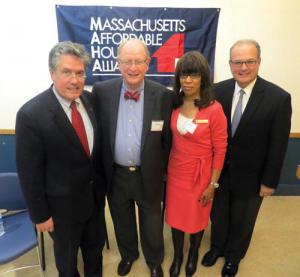December 6, 2012
 US Comptroller of the Currency Thomas Curry, left, with former Sovereign Bank vice president Thomas Kennedy, Bonita M. Irving, district community affairs officer for the Comptroller of the Currency, and Andrew Calamare, a former state banking commissioner
US Comptroller of the Currency Thomas Curry, left, with former Sovereign Bank vice president Thomas Kennedy, Bonita M. Irving, district community affairs officer for the Comptroller of the Currency, and Andrew Calamare, a former state banking commissioner
Twenty-three years ago, BayBank applied to the state to expand into Allston near the Boston University campus. But the company quickly ran into a problem with regulators, who noted that the bank was not expanding into low-to-moderate income communities like Dorchester and Mattapan. As a result, BayBank’s application was denied, under the Community Reinvestment Act.
The move set a precedent and forced BayBank to open five branches and 25 ATMs in the neighborhoods, including the first one in Mattapan. It later merged with Fleet Bank, and both were eventually swallowed up by Bank of America.
“A lot of the Bank of America branches you see are part of that expansion” from 23 years ago, says Tom Callahan, who is executive director of the Massachusetts Affordable Housing Alliance and has been with the homeownership education group since 1987. “Roxbury, Dorchester and Mattapan had been underserved and it was the first reversal of that trend.”
Callahan credits Thomas Curry, then a deputy commissioner at the state Division of Banks, as one of the regulators who made that happen.
On Monday night, Curry, who authored the precedent-setting decision, was honored by Callahan for his work while carrying a different title: US Comptroller of the Currency. His office oversees 2,000 national banks and federal savings associations. That night, Curry recalled the making of the BayBank decision: A Boston Globe survey of several companies’ bank machines in February 1989 had found that there were “four times more ATM locations in white areas.” BayBank was “creating a doughnut hole” in the city with its expansion, which affected “Dorchester in particular,” Curry said.
About 70 people turned out on Monday for MAHA’s annual meeting at his homeownership center on Dorchester Avenue, including Housing and Community Development Undersecretary Aaron Gornstein and Bob Sheridan, the former CEO of Savings Bank Life Insurance of Massachusetts.
“Homeownership has been a key element of the American dream and it can be an important asset-building tool, particularly for minority and lower-income families,” Curry told the gathering. “Indeed, one of the greatest tragedies of the financial crisis has been the disproportionate harm inflicted on borrowers from historically under-represented populations, especially those who were misled about the mortgage obligations they were taking on.”
Curry said the housing crisis was caused by “aggressive” mortgage brokers and originators who used underwriting standards to their advantage, and “made it possible for too many people to buy overvalued houses on terms they couldn’t afford to repay.”
He added: “And when the housing bubble burst, the mortgage industry did not have the operational capacity to implement viable loan modifications on a large scale or properly manage foreclosures. Modifications were further complicated by the variety of players and competing interests in the mortgage lending, servicing, and securitization chain. These are but a few of the challenges we have encountered and are working to address in order to support continued housing market recovery. Our collective wisdom and insights will be necessary as we work to help restore the mortgage and housing markets.”
Curry credited MAHA with helping to create homeownership opportunities with its counseling programs and providing regulators like him with “on-the-ground intelligence” about how banks are interacting with communities and meeting their needs.
After his speech, Curry said he was optimistic about the economy, despite “clouds like the fiscal cliff” – a reference to the tense negotiations in Washington over a combined $500 billion in cuts and taxes – and troubles in Europe.
“Mortgage interest rates are at historic lows,” Curry said. “While those trends are encouraging, it’s clear that we have a long ways to go to ensure that aspiring homeowners, particularly in minority and underserved communities, have access to financing.”


